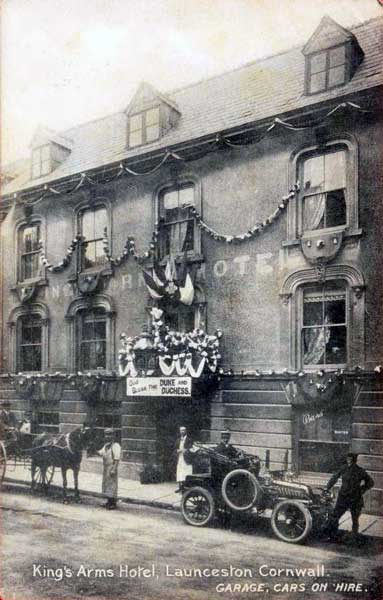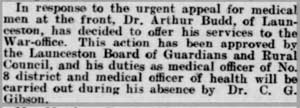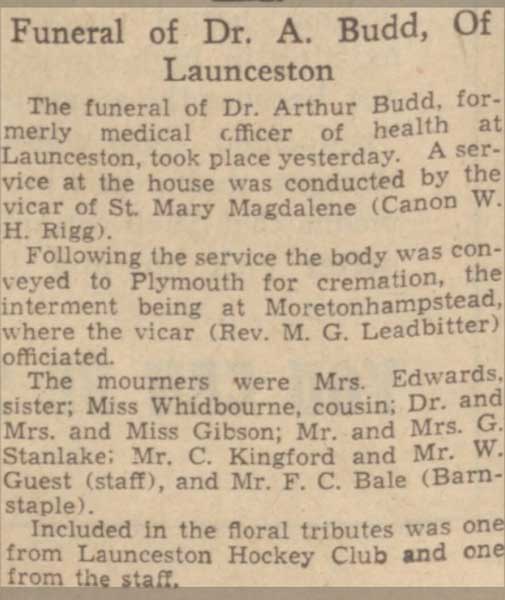.

Arthur was born in 1880 William and Mary Budd at Southernhaye, Exeter. His father was a surgeon. Arthur followed into his father profession gaining a M.B. Bach. At Durham University in 1904. He stayed with Mrs. Burnfather at Jesmond, Newcastle-upon-tyne.
He moved to take up the position of G.P. at Launceston’s Southgate surgery alongside Dr. W. Thompson and Dr. C. Gibson. With the outbreak of war he volunteered his services as a medic in August of 1815, and served with the R.A.M.C. acting as a Second Lieutenant, then Captain. He was slightly wounded whilst serving in Mesopotamia.

Serving at Gallipoli wrote back to friends on January 6th, 1916 detailing his experiences:
“All my work at present is in the trenches, dressing and attending to the wounded, whom I send on to the ambulance and clearing stations. My dug-out up here is just behind the trenches, with a little dressing station dug out in the cliff side and covered with sand bags for protecting. It is very exciting work up here, pretty ‘hot’ but great sport. The Turkish trenches are about 25 yards from our trenches. But in one part of the firing trench their trench is only within six yards of ours, so you can imagine one has to be very careful to keep well down below the sand bags parapet. The trench is so near that our Tommies throw their empty bully beef tins over into the Turks trench, and ‘Johnnie Turk’ throws his into ours in return. I watched the bombers for some time today sending over bombs from a huge catapult and watched the results through a periscope. Several Turks, or pieces of them, frequently could be seen being blown up into the air. This was in return for some damage their bombs did to our men in the morning, when, I am sorry to say, we lost several of our men. One Turk who was evidently tired of German company, came over the other night and gave himself up a prisoner, with hands up, and I have got his bayonet, which I shall try to send home, as it will be a great curio with its Turkish markings and half moons on it. A day or two ago they kept on putting up a dummy dressed up like a Turk, making out to our men it was one of them and enticing them to fire. Fortunately for us, they put it up too high- above the parapet of their trenches- and we could see the broom handle or whatever it was that it was mounted on. They have not sent over any gas lately, but we always carry our gas helmets with us when in the trenches, by order. Then part of my duties just now, too, are to see that the trench we are in is kept in a sanitary condition, and you have to be very careful about this in the trench, as if not, you would soon get still more struck down with disease. There are special men for all this sort of work called ‘Pioneers.’ It is all very exciting, but it is very noisy, of course, as the firing goes on all day and night, but somehow one gets use to it. One never possibly gets an undisturbed night up here and always gets called up to dress wounded many times a night, so I don’t undress at all, in fact one is not supposed to. I get a nap or two in the day when possible. I often wonder how things are going at Launceston. I think I told you in my previous letters I had received some letters from many kind friends from home, and one of your parcels has now reached me, so I am hoping the rest you speak of will turn up soon. You should see us all over our parcels, from the Colonel downwards, like a lot of schoolboys enjoying themselves with their tuck boxes. You have no idea what pleasure it is when we get a letter or parcel mail. It was a treat to get a home made cake, etc., as of course on active service the diet must necessarily be plain, and chiefly bully beef, but we always get plenty. I am keeping very fit and well, and I really never thought I should keep so well when I first saw so many going down with illness.”
During the course of his letter Dr. Budd made reference to ‘our exciting departure from Suvla Bay’ and what happened after; but this was omitted from the report but was later reported on, on March 4th, 1916, where Dr. Budd thanked the editor of the Cornish and Devon Post, Mr. Orchard Sharp, for the gift that was sent out at Xmas of 100 pipes, which had been handed out to the grateful men. “Please accept the very best thanks of the men of this ambulance and myself for the kind present of pipes, tobacco, etc, which we have received safely,” he said. “We are one and grateful to you and your readers for your kindness. I need hardly say that they were very much appreciated by us all and I thank you on behalf of my men for your kind gifts,” he added. He then went on to report on his activities of the last two months: “We have had a quite exciting time the last two months as this Ambulance took part in both evacuations of Suvla Bay and Cape Hellas and were practically the last off. I could tell you a lot, but censor forbids. The whole (censored) Division . . . . . . .We are at present resting and re-equipping and in about another week expect to be sent to Mesopotamia, when we expect we shall be kept pretty busy again. It seemed quite tunny to be away from the noise of shelling after having been in it continuously for three months. The climate out here is lovely just now and a treat after the rough weather we experienced with the blizzard in the Gallipoli Peninsula. We have just re-equipped our men with summer clothing and helmets and they look quite smart, but we looked very shabby when we arrived here I can tell you, as we lost nearly all our belongings to the evacuations.“
Dr. Budd again wrote back to his family this time aboard a Troopship on February 12th, 1916:
“We embarked at Suez, and have been at sea a week. We are on our way to Mesopotamia and in a few days or so expect to be in the thick of it again. We shall be at sea about another week, and shall be pushed right up to the front again. This is a very fine ship of 12,000 tons. We have nearly 3,000 troops on board, and about 60 officers in the mess. The (censored) Regiment are also on board. They have their own regimental M.O. We are having a very good time, and the days seem to fly. My mornings are mostly taken up with sick parades and inoculating the men, which takes us time, as we are about 1,000 strong. In the afternoons there are sports for the troops which one helps in. Then the inspection of the ship and mess food all takes time and so the day flies. We go right up the Persian Gulf and expect to be landed at Basra and encamp for a short time on the banks of the Euphrates or Tigris rivers and then go right up, in hope to meet the Russians! I am very glad to begin this Mesopotamia campaign. The health of the men on board is fairly good. I get a sick parade of about 50 every morning with different complaints and have several in hospital. We have a very good little hospital on board, right up on the boat deck. I have my own staff which is composed of 1 Sick Sergeant, 1 Corporal, 4 Dresser Orderlies, and 16 Regimental Stretcher Bearers. I have to give them lectures on Nursing and Bandaging, etc. We have a swimming bath on board and get lovely bathes every morning before breakfast. Reveille goes at six, and physical drill at 6:30 for the men. I join in sometimes for this, as it is good exercise and helps to keep one fit. but it is optional for us. All the ship’s officers are Naval men or Naval Reserve and the three officers mess with ours and the ship’s Captain takes one end and the Colonel of the Battalion the other. Hope all are well at home, etc.!
After arriving in Mesopotamia and being just a few miles from Kut, Arthur wrote back on August 2nd, 1916:
“Just a few lines to let you know how things are going on. I daresay you may have heard that our ….Division were sent from the Gallipoli Peninsula Campaign to Mesopotamia as relieving Forces for the relief of General Townshend. We had a quiet but interesting time coming up the river Tigris, passing through many historical places of interest. It was very slow work coming up the first few hundreds of miles, for owing to the shallowness of the river the troops had to be brought up river in comparatively small steamers; then we drew into the bank of the river every night and encamped and did the cooking for the men’s food for the day. One night we camped in the original ‘Garden of Eden’; but there were no apples to be seen, however. Other nights we encamped at Sodom and another at Gomorrah. Beyond their Biblical interest I have little to say, for they are about the most god-forsaken places you could imagine and mere deserts. Our real hard had commenced after we had travelled several hundreds of miles up the Tigris, and after heavy marching night and day we eventually reached the Front, where we relieved the ….Division for the final push to try and relieved Kut. We knew towards the end how many days more Townshend could hold out, which made things more exciting and at the time of the fall of Kut we were only eight miles away. We had some very stiff fighting the last few days and fought four battles in nine days. So you can imagine I was kept very busy. Unfortunately, this regiment lost pretty heavily in the last engagement, both in men and officers.
We were all very disappointed of course at not obtaining our object, but the Division did well, and we see the papers at home speak highly of our efforts, and talk of us as the Iron….Division from Gallipoli. As M.O. of a regiment you get a more exciting time than when at an Ambulance, for you are with the Battalion all the time, and, with your Medical Orderly, follow up the Battalion in all their attacks and charges and attend the wounded as they fall and are exposed to shell and machine gun fire all the time. I will merely add that I am extremely fortunate after the last engagement to be here and able to write this letter today. I often wonder how things are going with you all at home, and Lanson must be almost depleted of men of suitable age by now. The women are doing wonderful work, which will all help to terminate this bloody war. I was very interested in reading in the Cornish and Devon Post the agricultural demonstrations at Scarne by the women. One cannot overestimate the valuable work women are doing. We all rejoice at the victory of our navy off Jutland, but of course the news would be very stale to you by the time it reached us. I trust you are keeping well yourself. I am glad to say, so far, I have been fortunate enough to keep un excellent health myself, for which I am thankful, for at times my work has been very, very heavy, long hours and sometimes after engagements working night and day getting the wounded evacuated. At present, we are having a quieter time and have been relieved from the firing line, and we are away back a little.
Sickness is plentiful among the troops for this is a very trying climate with the terrific heat. The temperature daily now is 120-126 degrees in the shade every day. Fortunately, we get cool nights, the temperature falling to 75-80 degrees which is our saving. We get all sorts of disease to deal with out here – cholera, malaria, heatstroke, sandfly fever, heat exhaustion as well as snake bites and other such aliments. At present there are about 2,000 sick from one cause or another in the Field Ambulance. Well, I must conclude this now. My kind regards to all friends at Lanson and with the same to Miss Sharpe and yourself.
Arthur continued his communications from Mesopotamia the following March, on the 1st in 1917:
We have been having a most exciting time the last few days, but on the other hand a very strenuous time, but are all very fit and well; and our continued successes compel us to keep the enemy on the move; after each fight we are following them up. We have had some very stiff fighting this week, and have utterly routed the enemy, while our navy on the Tigris has done splendid work in conjunction. We are all in great spirits today, for yesterday our monitors re-captured the monitor “Firefly,” which the Turks took from us in General Townshead’s time. Also our ship “Buara,” with 1,100 prisoners and the monitors sank the Turkish flagship yesterday. The Buara’s 1,100 prisoners were all wounded prisoners and also another barge with 800. It is all splendid and we are all a keen as mustard to push on to get more, and annihilate the Turkish army. The total enemy killed, captured and wounded is roughly estimated at 15,000 up to date. So you can imagine what fighting we have been through. You will have heard by now that we have taken Kut, over which the Union Jack flag is now flying. We have now left Kut far behind and are a long way further up. We are doing as much as 15 to 20 miles a day and at night just lay down anywhere. We have our blankets, and my old pal, the “sleeping bag,” goes with me everywhere, so we keep warm, and rig up little bivouacs to keep the winds off. We get water from the river, which I have to chlorinate for the battalion before use.
We pushed on here yesterday after fighting, and terribly punished the enemy. I had to stay behind with armed mounted escort to attend and treat wounded Turks we picked up on the way, who had been lying about wounded. One wretched Turk had one leg blown off and half another foot. It is marvellous how he lived untreated for so long. I caught up the battalion later on. I am glad of my horse in these long marches, and am so fond of him. It is surprising how they get used to the noise of the guns. We have captured 21 large guns, so far, from the Turks since the present operations began. I am awfully fit and well, and love the excitement, and this rough life seems to suit me. Our food is just bully-beef and biscuits and tea at present, but plenty; we get a good feed of this when we get in at night. Goodness only knows when we shall get any letters again and parcels, but they will bring them up the river as soon as possible, for we are pushing up the enemy so fast, and are pushing on to Bagdad. You will understand how difficult it is to write under these present conditions. I am sitting now in a crump-hole (shell-hole) writing this, and we are just off again.”
After the war he returned to his original role at Launceston and continued as the Medical Officer for the Health Board. Arthur never married and he died in May 1937. The funeral service was held at his home by the Canon W. H. Rigg followed by cremation at Plymouth and internment at Mortonhampstead.

Visits: 98
